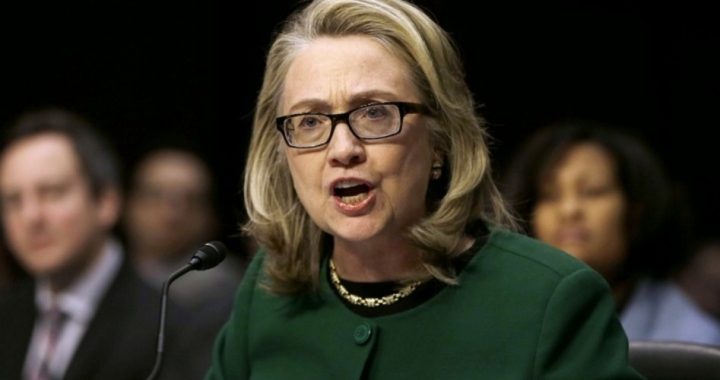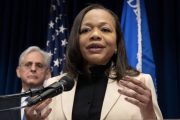
The retired diplomat who led the State Department investigation into last year’s attack on the U.S. diplomatic outpost in Benghazi defended on TV interview programs Sunday the decision not to question former Secretary of State Hillary Clinton. Former Ambassador Thomas J. Pickering said the Accountability Review Board, created by the department to review the events surrounding the attack, determined that responsibility for what happened fell below the secretary’s level. The panel also did not question Clinton’s two deputies because it had concluded mistakes were made by lower-level officials.
“We had plenty of opportunity had we felt it was necessary, all five of us, to ask them questions,” said Pickering, co-chairman with former Joint Chiefs of Staff Chairman Admiral Michael Mullen on the review board. “We didn’t believe that was necessary, and I don’t see any reason to do so now.” The board reviewed the findings with Clinton but did not question her, Pickering said, because “we had questioned people who had attended meetings with her” and “I don’t think that there was anything there that we didn’t know.”
The investigation was criticized by witnesses at a House Oversight and Government Reform Committee hearing last week. The board’s report let high-level State Department officials “off the hook” said Gregory Hicks, a Foreign Service diplomat who was deputy chief of mission in Libya at the time of the Benghazi attack. Eric Nordstrom, regional security officer in Libya until a few months before the attack, told the committee that the buildings at the Benghazi outpost did not meet security standards for diplomatic facilities that were adopted after the bombing attack on U.S. embassies in East Africa in 1998.
“We did not meet any of those standards,” Nordstrom said of the Benghazi facility that was overrun and set ablaze by heavily armed extremists last September 11 in an attack that killed U.S. Ambassador to Libya Christopher Stevens and three other Americans. “It’s my understanding only the Secretary of State could waive those requirements,” he told the committee. The Pickering-Mullen probe, he said, “stopped short of the very people it should have asked — Undersecretary for Management [Patrick] Kennedy and above.”
The United States opened the Benghazi facility following the 2011 overthrow of Libyan ruler Moammar Gadhafi by rebel forces, assisted by U.S. and NATO air strikes. President Obama intervened in the conflict without the approval of Congress and despite warnings of a heavy presence of Islamic jihadists in the rebel ranks. Since the September attack, controversy has raged over charges of inadequate security at the site and also over revisions and omissions in official versions of the attack. An ABC News report Friday revealed White House and State Department revisions of CIA “talking points,” given to members of Congress and other government officials, deleted references to al Qaeda and to previous CIA warnings of terrorist threats in various parts of Libya, including Benghazi.
On NBC’s Meet the Press Sunday, Pickering and House Oversight Committee chairman Darrell Issa (R-Calif.) argued over who was responsible for Pickering not testifying at a committee hearing.
“Ambassador Pickering, his people and he, refused to come before our committee,” Issa said.
“That is not true,” Pickering said. “I said the day before the hearings I was willing to appear, to come to the very hearings he excluded me from,” the ambassador said, referring to Issa.
“Don’t tell me I excluded you,” Issa countered.
“We were told the [Republican] majority said I was not welcome at that hearing,” Pickering said. “I could come at some other time.”
Issa said the committee wanted to explore whether enough witnesses had been interviewed in the State Department report to fix responsibility for what happened in Benghazi. “Ultimately, if that got it right, then we can put this to a rest,” he said. “We believe it was insufficient.” The chairman said the committee wants to “go through at length” how the board “reached its conclusions, who it interviewed, and why we believe there are shortcomings.”
Issa also appeared on the CBS program Face the Nation, where he tangled with Richard Durbin of Illinois, the Senate’s second-ranking Democrat.
“Unfortunately, this has been caught up in the 2016 presidential campaign, this effort to go after Hillary Clinton,” Durbin charged. “The reason she wasn’t interviewed — because she didn’t have any direct-line responsibility for the decisions that were made. But they want to bring her in because they think it’s a good political show.”
Issa denied that the purpose of the investigation is to target either Clinton or Obama. But he claimed that initial accounts of the assault arising from the appearance of an American-made anti-Muslim video on YouTube concealed the nature of the terrorist attack. “The American people were effectively lied to for a period of about a month,” he said. “It was never about a video.”
Appearing on the same program, Robert Gates, who served as secretary of defense under President George W. Bush and for the first two and a half years of the Obama administration, dismissed the suggestion that the military could have rescued the mission by sending in jets or special forces during the attack. “Frankly, I’ve heard ‘Well, why didn’t you just fly a fighter jet over and try and scare ’em with the noise or something?'” Gates said. “Well, given the number of surface-to-air missiles that have disappeared from Qaddafi’s arsenals, I would not have approved sending an aircraft, a single aircraft, over Benghazi under those circumstances.”
If Gates is right, that could give rise to an even more disturbing question concerning the nation’s defense: How is it that a nation spending $600 billion a year on its military, with troops and bases at various points around the globe, is unable to come to the defense of one of its own diplomatic outposts when it is under attack?
Photo of Hillary Clinton: AP Images



